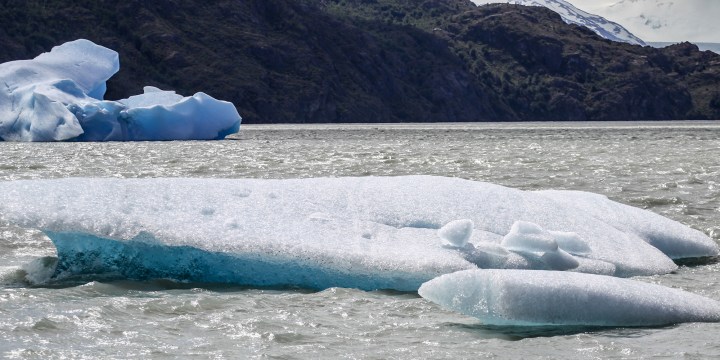OUR BURNING PLANET
Antarctic sea ice in sudden and dramatic decrease

After studying 40 years of satellite data, Nasa climatologist Claire Parkinson has found that levels of Antarctic sea ice have plummeted dramatically since 2014, after years of steadily increasing. The implications for South Africa could be serious.
The decrease in sea ice levels in the Arctic has become a symbolic representation of climate change over the last few years, with cruise ships now able to traverse Arctic passages that, mere decades ago, were thought impenetrable.
But while the Arctic was warming, its polar opposite, Antarctica, was doing the exact opposite. Sea ice levels at the South Pole showed a steady increase until 2014, according to a report released on 1 July in the Proceedings of the National Academy of Science of the United States of America by Nasa scientist Claire Parkinson.
In the study, Parkinson acknowledges that the uneven and gradual increase in sea ice coverage in Antarctica, which occurred between the 1970s up until 2014, has puzzled scientists for years, and an explanation for the trend has yet to be uncovered.
But after 2014 there was a sudden and dramatic decrease in sea ice around Antarctica.
Between 2014 and 2017, the loss in sea ice averaged about 730,000km² per year, approximately double the size of the Northern Cape, South Africa’s largest province. The decrease is so dramatic that in the three years between 2014 and 2017 Antarctica showed a greater decrease in sea ice levels than the Arctic has seen in more than three decades.
According to Siobhan Johnson, a master’s student at the University of Cape Town researching physical and mechanical properties of Antarctic and artificial sea ice, melting sea ice does not result in increased sea levels.
“Picture it this way: if you have a glass of frozen water and the water defrosts, the amount of water you have won’t change. But if you add ice blocks to a glass of water, when that ice melts you’ll have more water.”
Unlike the Arctic sea, which is frozen all year round, the Antarctic sea freezes only in winter months. Despite this, sea ice has a significant impact on the environment. When sea ice melts in summer, it brings with it cold currents that maintain a cool ocean temperature. Sea ice also reflects the sun’s rays, and as such it keeps the area around it cool. Without ice, sunlight is absorbed directly into the ocean, causing it to get hotter than normal.
As one of the closest countries to the South Pole, South Africa is directly impacted by Antarctica’s temperatures and sea life. According to Johnson, decreasing sea ice levels can potentially affect the southern African climate, particularly if the trend continues.
“If global temperatures continue to increase and sea ice levels in the Antarctic decrease, we’ll see more extreme weather patterns,” Johnson told Daily Maverick.
“Summers would be hotter and drier, which would lead to more droughts, while Durban, for example, would experience heavier and more frequent thunderstorms.”
Ahmed Mokgopo, a campaigner for the environmental organisation 350Africa.org, also told Daily Maverick of the impact changing global temperatures will have on the country:
“South Africa is highly vulnerable to the impacts of the climate crisis, which include worsening droughts, dangerous heat waves and wildfires. Yet South Africa is still planning to build more coal-fired power stations. We know that every ton of coal burned contributes to global heating. In order to stay below a 1.5°C temperature rise we need to stop burning fossil fuels now.”
Although Parkinson acknowledges that the cause of the sudden decrease in Antarctic sea ice levels is not known, above all else the study proves how much the “interconnected global climate system” impacts the entire world. Melting sea ice in Antarctica is tied to environmental and climate effects right on our doorstep, and also on the other side of the world.
Now, as global temperatures continue to rise, sea ice is retreating at both poles. DM


















 Become an Insider
Become an Insider